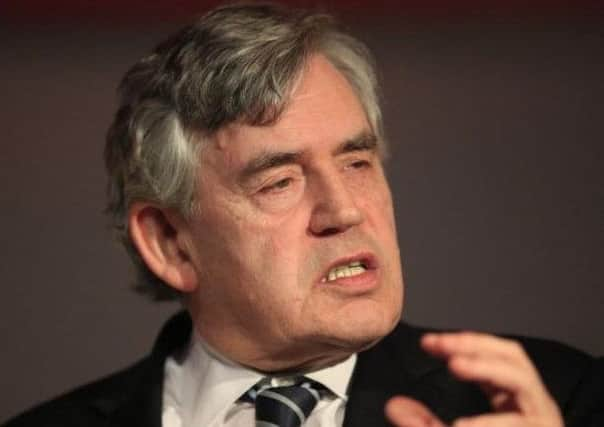Gordon Brown: I was left behind by '˜touchy feely' social media dawn


The former Labour leader has admitted that he was left behind by the social media age and was not an “ideal fit” as the “personal side of politics” came to the fore.
He insisted he was not aloof or remote, but was grounded in his belief that what mattered was what he could achieve for the country in government not what “I said about myself”.
Advertisement
Hide AdAdvertisement
Hide AdThe highly-personal account of his life in politics has emerged in his memoir, My Life, Our Times, which is published next month on the tenth anniversary of him becoming prime minister.
“In a far more touchy-feely era, our leaders speak of public issues in intensely personal ways and assume they can win votes simply by telling their electors that they ‘feel their pain,” Mr Brown says. “For me, being conspicuously demonstrative is uncomfortable.”
The former Kirkcaldy and Cowdenbeath MP says he could recall a different mood about half a century ago when leaders were deemed “self-absorbed and out of touch” if they were constantly self-referential in public. “I was born about 40 years before the World Wide Web and arrived in Parliament 20 years before the advent of Twitter,” he added.
“During my time as an MP I never mastered the capacity to leave a good impression or sculpt my public image in 140 characters. Now no politician can succeed without mastering social media – and yet, in it, the prime minister becomes one among millions of voices competing to be heard.”
First Minister Nicola Sturgeon and Scotland’s opposition leader Ruth Davidson are both active users of social media and boast thousands of Twitter followers. Although Prime Minister Theresa May is on Twitter, she has faced similar criticism to Mr Brown for seeming more out of touch than her more PR-friendly predecessor David Cameron.
Perhaps Mr Brown’s most open show of emotion came during a TV interview with Piers Morgan in 2010 when he spoke of the death of his baby daughter Jennifer.
The former prime minister and with wife Sarah were also keen to protect their sons John and Fraser from the limelight.
“I fully understand that in a media-conscious age every politician has to lighten up to get a message across and I accept that, in the second decade of the 21st century, a sense of personal reserve can limit the appeal and rapport of a leader.
Advertisement
Hide AdAdvertisement
Hide Ad“I am not, I hope, remote, offhand or uncommunicative. But if I wasn’t an ideal fit for an age when the personal side of politics had come to the fore, I hope people will come to understand this was not an aloofness or detachment or, I hope, insensitivity or a lack of emotional intelligence on my part.
“Really, to my mind, what mattered was not what I said about myself, but simply what our government could do for our country.”
Mr Brown was ousted from office in 2010 when Mr Cameron replaced him in Downing Street at the helm of a Tory-Lib Dem Coalition. He describes his “biggest regret” as not being able to persuade the British public to back his response to the global financial crisis of 2008, and the “progressive policies” he pushed for.
He added: “We won the battle – to escape recession. But we lost the war – to build something better. I fell short in communicating my ideas. I failed to rally the nation around the necessary fiscal stimulus and my plans for radical change.”